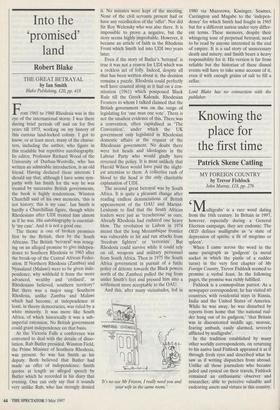Into the `promised' land
Robert Blake
THE GREAT BETRAYAL by Ian Smith Blake Publishing, £20, pp. 418 From 1965 to 1980 Rhodesia was in the eye of the international storm. I was there during brief periods off and on for five years till 1973, working on my history of this curious land-locked colony. I got to know, or at least meet, many of the charac- ters, including the author, who figure in this readable but repetitive autobiography. Its editor, Professor Richard Wood of the University of Durban-Westville, who has written an admirable introduction, is an old friend. Having declared these interests I should say that, although I have some sym- pathy with Ian Smith for the way he was treated by successive British governments, the book is highly tendentious. Winston Churchill said of his own memoirs, 'this is not history; this is my case'. Ian Smith is hardly a Churchillian figure, though white Rhodesians after UDI treated him almost as if he was. His autobiography is essential- ly 'my case'. And it is not a good one.
The theme is one of broken promises first by the British, then by the South Africans. The British 'betrayal' was reneg- ing on an alleged promise to give indepen- dence to Southern Rhodesia in 1963 after the break-up of the Central African Feder- ation. If Northern Rhodesia (Zambia) and Nyasaland (Malawi) were to be given inde- pendence, why withhold it from the more advanced, wealthy and 'civilised', as Rhodesians believed, southern territory? But there was a major snag. Southern Rhodesia, unlike Zambia and Malawi which had become, at independence at least, in theory democracies, was ruled by a white minority. It was more like South Africa, of which historically it was a sub- imperial extension. No British government could grant independence on that basis.
At the Victoria Falls a conference was convened to deal with the details of disso- lution. Rab Butler presided. Winston Field, the Prime Minister of Southern Rhodesia, was present. So was Ian Smith as his deputy. Both believed that Butler had made an offer of independence. Smith quotes at length an alleged speech by Butler which he recorded in his diary that evening. One can only say that it sounds very unlike Rab, who has strongly denied it. No minutes were kept of the meeting. None of the civil servants present had or have any recollection of the 'offer'. Nor did Sir Roy Welensky who was also there. It is impossible to prove a negative, but the story seems highly improbable. However, it became an article of faith in the Rhodesia Front which Smith led into UDI two years later.
Even if the story of Butler's 'betrayal' is true it was not a reason for UDI which was a reckless act of folly. Indeed, despite all that has been written about it, the decision remains a puzzle. Rhodesia could perfectly well have coasted along as it had on a con- stitution (1961) which postponed Black Rule till the Greek 'Calends. Rhodesian Fronters to whom I talked claimed that the British government was on the verge of legislating for 'one man one vote'. There is not the smallest evidence of this. There was a convention, often capitalised as 'The Convention', under which the UK government only legislated in Rhodesian domestic affairs at the request of the Rhodesian government. No doubt there were hot heads and ideologists in the Labour Party who would gladly have reversed the policy. It is most unlikely that Harold Wilson would have paid the slight- est attention to them. A collective rush of blood to the head is the only charitable explanation of UDI.
The second great betrayal was by South Africa. It is quite a pleasant change after reading endless denunciations of British appeasement of the OAU and Marxist- Leninism to find that the South African leaders were just as 'treacherous' as ours. Already Rhodesia had endured one heavy blow. The revolution in Lisbon in 1974 meant that the long Mozambique frontier was vulnerable to hit and run attacks from `freedom fighters' or 'terrorists'. But Rhodesia could survive while it could rely on oil, weapons and military personnel from South Africa. Then in 1975 the South Africa government in pursuit of a futile policy of détente towards the Black powers north of the Zambezi pulled the rug from under Smith's feet and pressed him into a settlement more acceptable to the OAU.
And this, after many vicissitudes, led in `It's no use Mr Friston, I really need you and your wife in the same room.' 1980 via Muzorewa, Kissinger, Soames, Carrington and Mugabe to the 'indepen- dence' for which Smith had fought in 1965 but for a different nation under very differ- ent terms. These memoirs, despite their whingeing tone of perpetual betrayal, need to be read by anyone interested in the end of empire. It is a sad story of unnecessary death and misery, and Smith bears a heavy responsibility for it. His version is far from reliable but the historian of these dismal events will have to take some account of it, even if with enough grains of salt to fill a cellar.
Lord Blake has no connection with the publisher.


































































 Previous page
Previous page